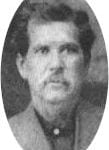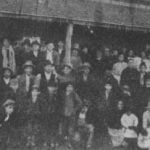Redbird Smith, who was the moving spirit of the Nighthawk branch of the Keetoowah Society of Full-blood Cherokees, was born July 19th, 1850, somewhere near the city of Ft. Smith, Arkansas. His father and mother, together with other Cherokees being enroute to Indian Territory from Georgia.
Pig Redbird Smith, (the name Smith being added by the white people in Georgia because he was a blacksmith by trade), was an old and ardent adherent of the ancient rituals, customs and practices of the Long House group of eastern Indians of which the Cherokees were the head band or tribe.
The wife of Pig Redbird Smith and mother of Redbird Smith was Lizzie Hildebrand Smith, a woman who carried the best blood-lines of the Cherokees.
At an early date in the boyhood life of Redbird Smith, his father dedicated him to the services and cause of the Cherokee people in accordance with ancient customs and usages. At the early age of ten years, Redbird received instruction at the council fires. At this time, the latter part of 1859, Pig Redbird Smith, Budd Gritts and Vann, all being impressed with the virtues of the religious and moral codes of the ancient Keetoowah order, concluded to reorganize.
Redbird Smith’s Home
Budd Gritts, who was a Baptist Minister, was prevailed upon to draft a Constitution and Laws of government for the use of the people in their group, which was compatible with the changing conditions religiously and Politically. The constitution and Laws of Government was formally adopted and the Keetoowah prospered and lived in peace under it for many years.
During the period from 1859 to 1889, the Keetoowah flourished and were strongly united. Almost without exception the Keetoowah went with the North in the Civil War. In all this period the Keetoowah were either Baptists, Methodists, Presbyterians, a few Quakers, and a part of them worshipped according to the rituals of the ancient Keetoowah, but all got along harmoniously. Dissentions came only after the white Missionaries objected to and condemned what they termed the Pagan Form of worship of the ancient Keetoowah, and designated as The work of the Devil.
Influenced by these white teachers, who were conscientious and sincere in their efforts of Christian work, the members of the different denominations became strictly sectarian in their practice, but there was still no enmity existing.
The Keetoowah Constitution and Laws of Government was amended in 1889, making it rather a political organization in character. From this period the differences between the Christian Keetoowah and the Ancient Keetoowah became more marked, and there was lack of harmony even in their policies of political effort.








